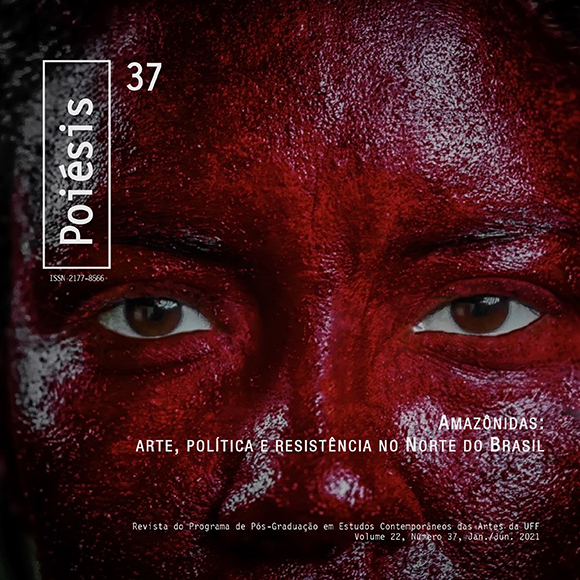Mysticism in Theo Angelopoulos' Work: A Study of Eternity and a Day (1998)
DOI:
https://doi.org/10.22409/poiesis.v22i37.45525Keywords:
cinema, mysticism, AngelopoulosAbstract
Theodoros Angelopoulos' late work, developed in the 1990s, has po-litical and human attributes already perceived and deciphered by critics and academia. However, we also notice in his films a mystical aspect that has not yet been explored in any of these media. The purpose of this article is to characterize the mystical experience in a particular production by the Greek director. Our object of study will be the work Eternity and a day (Mia aioniotita kai mia mera, 1998). We will use as theoretical support authors like Robert Charles Zaehner, Steven Katz, Paul Schrader and Frederico Pieper.
Downloads
References
ANDREW, Geoff. Theo Angelopoulos: The Sweep of History. Sight and Sound, 2012. Disponível em http://old.bfi.org.uk/ sightandsound/feature/49816. Acesso em 25/11/2019.
BIRD, Michael. Film a Hierophany. In: MAY, John R. ; BIRD, Michael. Religion in Film. Knoxville: The University of Tennessee Press, 1998, p. 3-22.
BRYANT, Darrol. Cinema, Religion and Popular Culture. In: MAY, John R. ; BIRD, Michael. Religion in Film. Knoxville: The University of Tennessee Press, 1998, p. 104-114.
CABRAL, Jimmy Sudário; BINGEMER, Maria Clara (Org.). Finitude e Mistério. Mística e literatura moderna. Rio de Janeiro: PUC-Rio; Mauad, 2014
CIMENT, Michel. The State of Cinema. Unspoken Cinema, 2003. Disponível em http://unspokencinema.blogs-pot.com/2006/10/state-of-cinema-m-ci-ment.html. Acesso em 10/12/2018.
FLANAGAN, Matthew. Bakhtin and the Movies. New Ways of Understanding Holly-wood Film. Londres: Palgrave Macmilln, 2009.
FLANAGAN, Matthew. Towards an Aesthetic of Slow in Contemporary Cinema. 16:9, nov. 2008. Disponível em http://www.16-9.dk/2008-11/side 11_inenglish.html. Acesso em 10/12/2018.
HORTON, Andrew. The Films of Theo Angelopoulos: A Cinema of Contemplation. Princeton: Princeton University Press, 1997.
HORTON, Andrew. The Last Modernist: The Films of Theo Angelopoulos. Trowbridge: Flicks Books, 1997.
KATZ, Steven. Mysticism and Philosophical Analysis. Nova York: Oxford University Press, 1978.
KATZ, Steven. Mysticism and Religious Traditions. Nova York: Oxford University Press, 1983.
KATZ, Steven. Mysticism and Language. Nova York: Oxford University Press, 1992.
KATZ, Steven. Mystical Speech and Mystical Meaning. Nova York: Oxford University Press, 1992a.
KOUTSOURAKIS, Angelo & STEVEN, Mark. The Cinema of Theo Angelopoulos. Edinburgo: Edinburgh University Press, 2015.
ORICHIO, Luiz Zanin. O cinema humanista de Theo Angelopoulos. O Estado de São Paulo, 26/1/2012. Caderno de Cultura. Disponível em https://cultura.estadao.com.br/blogs/ luiz-zanin/o-cinema-humanista-de-theo-angelopoulos/. Acesso em 20/4/2019.
PIEPER, Frederico. Religião e Cinema. São Paulo: Fonte Editorial, 2015.
PROUST, Marcel. No caminho de Swann. Tradução de Mário Quintana. São Paulo: Globo, 2006. (Em busca do tempo perdido, v. 1).
SCHRADER, Paul. Transcendental Style in Film: Ozu, Bresson, Dreyer. Berkeley. University of California Press, 1972.
VANOYE, Francis; GOLLIOT-LÉTÉ, A. Ensaio sobre a Análise Fílmica. Campinas: Papirus, 1994.
ZAEHNER, Robert Charles. Mysticism Sacred and Profane. Nova York: Oxford University Press, 1961.
Filmografia
A Eternidade e um dia. Direção: Theo Angelopoulos. São Paulo: Versátil Home Vídeo, 1998. 132 min., VHS, som, cor, legendado (material digitalizado).
Published
How to Cite
Issue
Section
License
Copyright (c) 2020 carlos eduardo mendes de araújo couto

This work is licensed under a Creative Commons Attribution-NonCommercial-NoDerivatives 4.0 International License.
Authors who publish in Revista Poiésis agree to the following terms:
- The authors keep the copyright and grant the journal the right of first publication. The work is automatically licensed under the Creative Commons Attribution License, which enables its sharing as long as the authorship and initial publication in this journal are acknowledged.
- Authors are allowed and encouraged to distribute online their work published in Revista Poiésis (in institutional repositories or in their own personal page), since this can generate productive interactions, as well as increase the impact and citation of the published work (See The Effect of Free Access).


